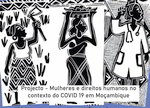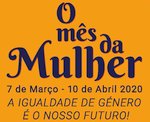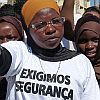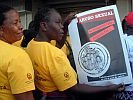Helena’s Capulanas
Short Story
by Maria José Arthur
She was sitting in the half-light, beside the trunk where she kept her treasures, her coloured capulanas, worn by time but still soft to the touch. The red, the orange and the green that spilled out from them gave colour and luminosity to the small room, which was furnished with two unmatched chairs for visitors, a cupboard with glass doors exhibiting a random collection of crockery, a huge table with carved legs that made movement almost impossible, and the modest mat, comfortable from much use, on which she sat.
Helena straightened her back and shifted her legs, since the years weighed heavy and did not allow her to remain in the same position for long. She knew she was dying, little by little each day, and even if this knowledge did not make her feel anguish it seemed to force her to recall past times and occasions. With difficulty, because the facts were clouded and what was left was the memory of emotions and a state of spirit. This capulana, for example, was associated with much happiness. The complicated arabesques in red and yellow released the scent of the earth and the hot sun, and brought fleeting images of a dear friend. She only remembered that to get the capulana they had both had to join the local dance group, and on one holiday the dancers had been given one each so that they would make a good show during the performance. That day they had left very early to go the city by lorry, and had waited until the afternoon before they performed. The two girls had stayed together, laughing and enjoying the movement, and afterwards they had eaten the cassava they had brought, sitting on the grass in a garden. How long ago was that? It didn’t matter much. The friend had died several years ago, but that smooth cloth brought back the memory of how fond they had been of one another.
These other capulanas, so many of them, with such a variety of ages and colours, were linked to the memory of her late husband. The oldest was his engagement present, very precious, with patterns that you never saw nowadays. Others bore witness to the many tender moments she had had with Saíde, which after so many years and even after his death filled her heart with feelings that she was unable to define, but which were lodged in her soul and almost made her weep with nostalgia. Except for that darker one, which she had only used once, at his funeral. It was in a corner, she didn’t even touch it, so as not to bring back the enormous grief of those days.
Helena had not been well for many years, but recently she knew that death was near. The first sign was when everyone she had played with as a child, and who had accompanied her through her nearly seventy years, disappeared. She was alone. The other alerts were constant and almost daily, always related to the way in which her body was functioning. Slowly, through the pain, she was becoming aware that she had hands, arms, legs and feet. When she was younger she had simply used them. Today the aches and pains forced her to feel every part of her body.
Helena had been waiting for death for some time. Without spending much time summing up her life, something she didn’t remember much of and in any case had never been proved to be useful to anyone, she felt that she was spent. Like a match that has burned out and no longer serves a purpose. She had been an active person, she had married and brought up children, she remembered the problems, but on balance the memories of happiness told her that she had had a good life. The proof was there in front of her, in those capulanas that told different stories of love, passion and friendship; the scintillating range of colours that seem improbable in normal life was appropriate to reflect her long and varied life.
With an effort she leaned over the trunk and chose some capulanas, using criteria for which only she knew the logic. Then she straightened up and patiently began to tie them round her waist one by one. She walked to the veranda and sat leisurely down, wrapped in Saíde’s love, the friendship of her many friends and her children’s affection.
She sat and waited for death to take her. No longer as an old woman with no history, anonymous like any other, but as a woman who has loved and been loved, who has given much and received much. She leaned back against the wall, relaxed her muscles and looked out at life one more time.
Maputo, 7 April 2001
—–
Capulana – the brightly coloured length of cloth used as clothing.







 Information in English
Information in English



















